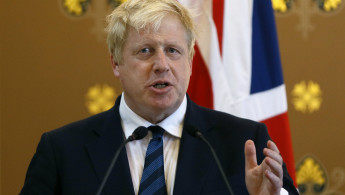Johnson has accused Syrian President Bashar al-Assad of 'barbaric military tactics' [Getty]
Syria's opposition-in-exile is sketching out details of its plan to bring the six-year civil war to an end at a special conference in London on Wednesday.
Opposition leaders have called for international support for the removal of President Assad from power, saying negotiations had failed because of the Damascus leader's intransigence.
"A packed conference room at the stately Arundel House is the setting for the unveiling of a new transition plan which negotiators hope will end Syria's five-year war," reported The New Arab's Paul McLoughlin from the conference.
"Riyad Hijab – once Syria's prime minister who defected to the opposition – says it will see a complete overhaul of the Syrian state to a new democratic future with justice for all."
Hijab, now of the opposition's High Negotiations Committee told the meeting: "The regime refused to talk about transition and we did not have any real negotiating rounds because the regime was not compliant.
"The US has to be serious about this."
Our correspondent said the plan started with a "nationwide truce".
"This, they say, is to be followed by an end to Bashar al-Assad's regime and the emergence of a new, democratic, inclusive Syrian state," he reported.
Hijab's call was bolstered earlier in the day by British Foreign Minister Boris Johnson, who called for the mistakes of the Iraq war to be avoided in finding a solution to the Syrian conflict.
Ahead of Wednesday's talks, Johnson accused Syrian President Bashar al-Assad of "barbaric military tactics" in the ongoing conflict, also criticising Russia's "seemingly indefensible conduct" of backing the Syrian leader.
Calling for Assad's removal from power, Johnson argued that it would be possible to avoid the turbulence that followed the ousting of Iraqi President Saddam Hussein in 2003.
"Why should the same not happen again?... Assad is not a strongman but a frighteningly weak leader who can never again hold his country together – not after the slaughter he has engaged in," the foreign minister wrote in The Times newspaper.
"The entire international community is committed, at least in principle, to getting rid of the Syrian dictator. Even the Russians have accepted that there must be political transition.
"But then the Russians are also employing their military muscle to prevent him from losing and to keep him in power," Johnson wrote.
Johnson said that one priority in ensuring an effective transition would be to avoid sweeping away existing state structures: "That was (one of) the mistakes in Iraq, and it will not be repeated."
The British foreign minister said plans would include a six-month negotiating phase between the regime and the opposition.
The subsequent 18 months would see Syria governed by a transitional body, made up of opposition figures, current government representatives and members of civil society.
According to the United Nations refugee agency UNHCR, the conflict in Syria, now in its sixth year, has forced more than 4.8 people from the country.
Follow us on Twitter - @the_newarab - for live updates.





 Follow the Middle East's top stories in English at The New Arab on Google News
Follow the Middle East's top stories in English at The New Arab on Google News
![Israeli forces ordered bombed Gaza's Jabalia, ordering residents to leave [Getty]](/sites/default/files/styles/image_330x185/public/2176418030.jpeg?h=a5f2f23a&itok=_YGZaP1z)

